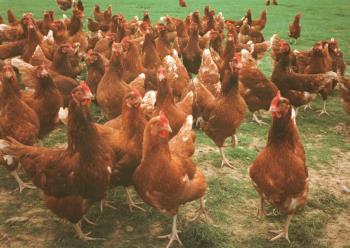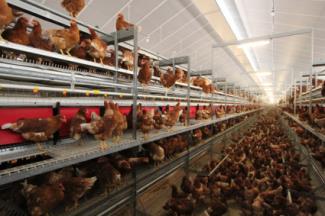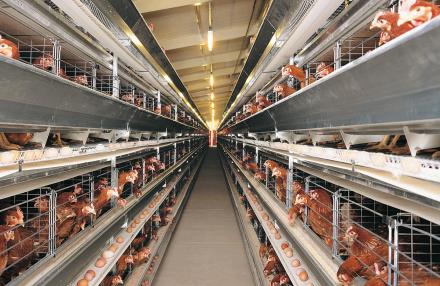 There is no Federal standard to distinguish among cage-free, aviary, barn, free-range and pastured housing of flocks. Welfare certification based on EU or U.K. standards can be assigned to specific categories and is presumably monitored by audit. The difference in unit revenue between either brown or white eggs derived from cages or alternatives to cages may exceed $1.50 per dozen at retail. The difference between eggs obtained from flocks held in barns or allowed access to pasture is even greater. The same is true for conventional and organic eggs. Large differences in value create an incentive to cheat by upgrading the designation of an egg. Product from alternatives to cages appeal to affluent and more selective consumers although sentiment is the only attribute distinguishing a cage-free egg from a pasture-derived product.
There is no Federal standard to distinguish among cage-free, aviary, barn, free-range and pastured housing of flocks. Welfare certification based on EU or U.K. standards can be assigned to specific categories and is presumably monitored by audit. The difference in unit revenue between either brown or white eggs derived from cages or alternatives to cages may exceed $1.50 per dozen at retail. The difference between eggs obtained from flocks held in barns or allowed access to pasture is even greater. The same is true for conventional and organic eggs. Large differences in value create an incentive to cheat by upgrading the designation of an egg. Product from alternatives to cages appeal to affluent and more selective consumers although sentiment is the only attribute distinguishing a cage-free egg from a pasture-derived product.
There is no practical analytical procedure to differentiate between eggs derived from cages as compared to alternative systems. After the 2013 EU cage ban came into effect, a scandal occurred in the U.K. when a major supermarket chain marketed eggs from Spain as cage-free despite the fact that they were derived from caged hens. Since eggs in the EU are not generally washed, it was possible by microscopic examination of shell surfaces to distinguish between eggs derived from cages and those on litter. Following washing as in the U.S. this distinction is not possible.
 The incentive to cheat is intensified under conditions of high demand. In reviewing IRI data, a specific U.S. producer of free-range and pastured eggs was able to increase sales within a week from approximately 400,000 dozen to close to 600,000 dozen and to maintain this level through the period of high demand from mid-March through April. It is possible to achieve an increase in sales within a week providing the producer concerned drew on a substantial inventory. To sustain output over a number of weeks presumes that flocks in production were placed at least 30-weeks previously. No one could have predicted the COVID-19 surge in demand back in August 2019. Producers can increase sales of a specific brand by purchasing eggs from other producers at relatively short notice, providing supplies are available. This would not have been the situation in mid-March given demand for eggs of all categories from generic through pasture- reared.
The incentive to cheat is intensified under conditions of high demand. In reviewing IRI data, a specific U.S. producer of free-range and pastured eggs was able to increase sales within a week from approximately 400,000 dozen to close to 600,000 dozen and to maintain this level through the period of high demand from mid-March through April. It is possible to achieve an increase in sales within a week providing the producer concerned drew on a substantial inventory. To sustain output over a number of weeks presumes that flocks in production were placed at least 30-weeks previously. No one could have predicted the COVID-19 surge in demand back in August 2019. Producers can increase sales of a specific brand by purchasing eggs from other producers at relatively short notice, providing supplies are available. This would not have been the situation in mid-March given demand for eggs of all categories from generic through pasture- reared.
Based on experience in the industry it is accepted that producers conform to an acceptable level of ethics. Unfortunately, some unscrupulous individuals have indulged in deceptive marketing practices. In the early 2000's, eggs from barn-housed flocks were marketed by one producer as "free roaming", an acceptable if non-defined descriptor. The deception however related to the label that depicted hens on pasture. The combination of the “free roaming” descriptor and the visual image on the carton created the impression that hens were actually allowed extensive outside access that was not the case.

Recognized and enforced standards are required to maintain the confidence of consumers paying a premium for eggs obtained from specific types of housing. This is only fair to the producers who invest capital in facilities, labor and incur other costs to produce cage free, free range and pastured eggs priced according to housing system.
The certifying agencies providing logos based on standards with audits could form the basis of national standard. Unless the industry conforms to uniform standards, a patchwork of alternatives will be a disservice to consumers and allow unscrupulous producers and packers to perpetuate scams based on misrepresentation. Given clearly defined statutory standards with auditing and confirmation, the Federal Trade Commission should have the authority to sanction and fine producers deviating from ethical principles.